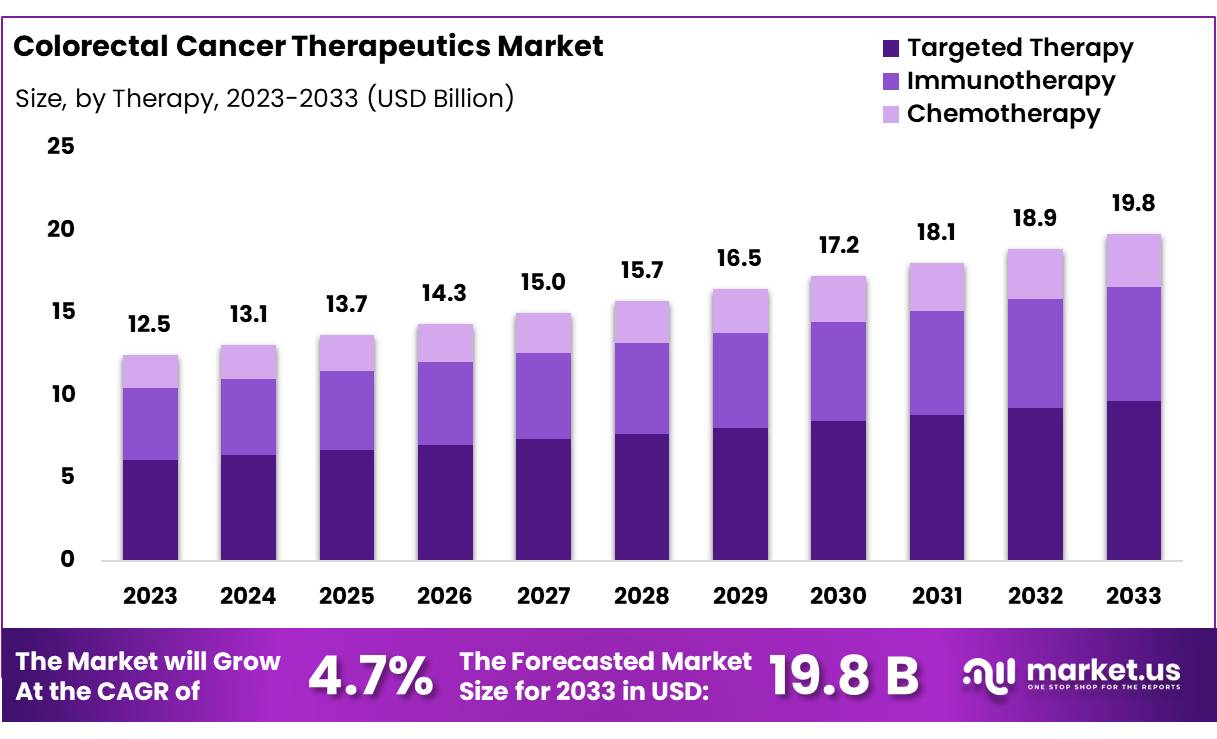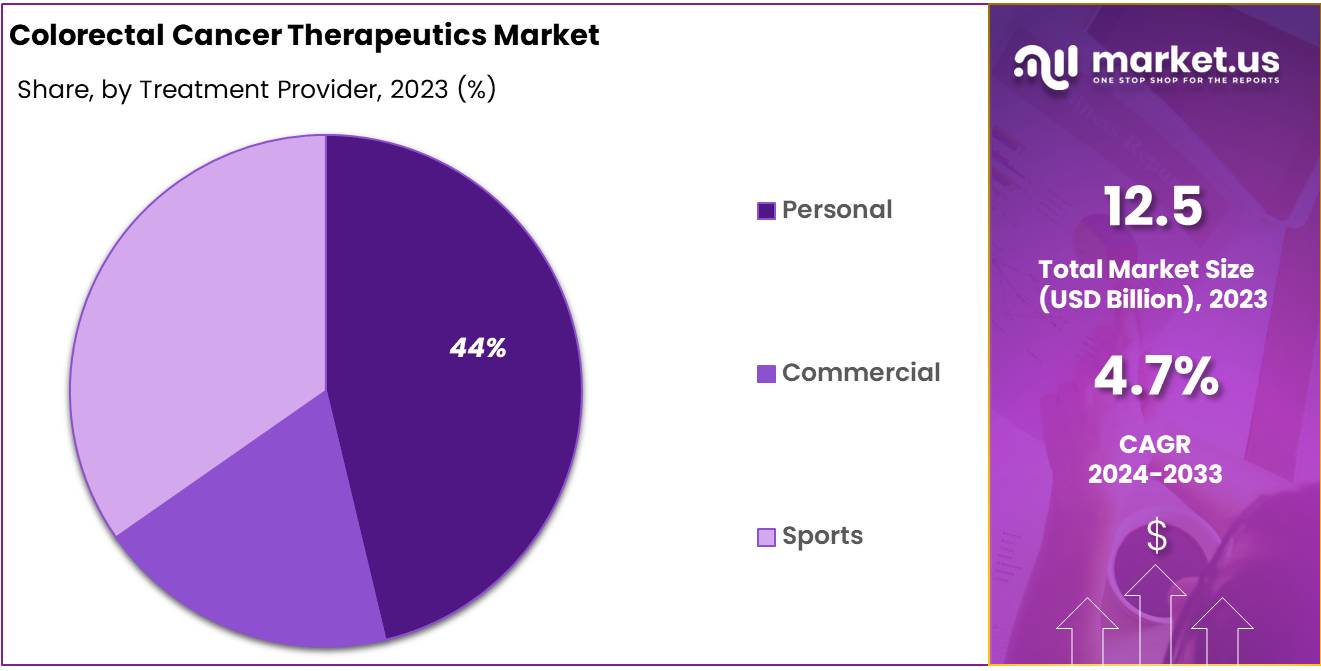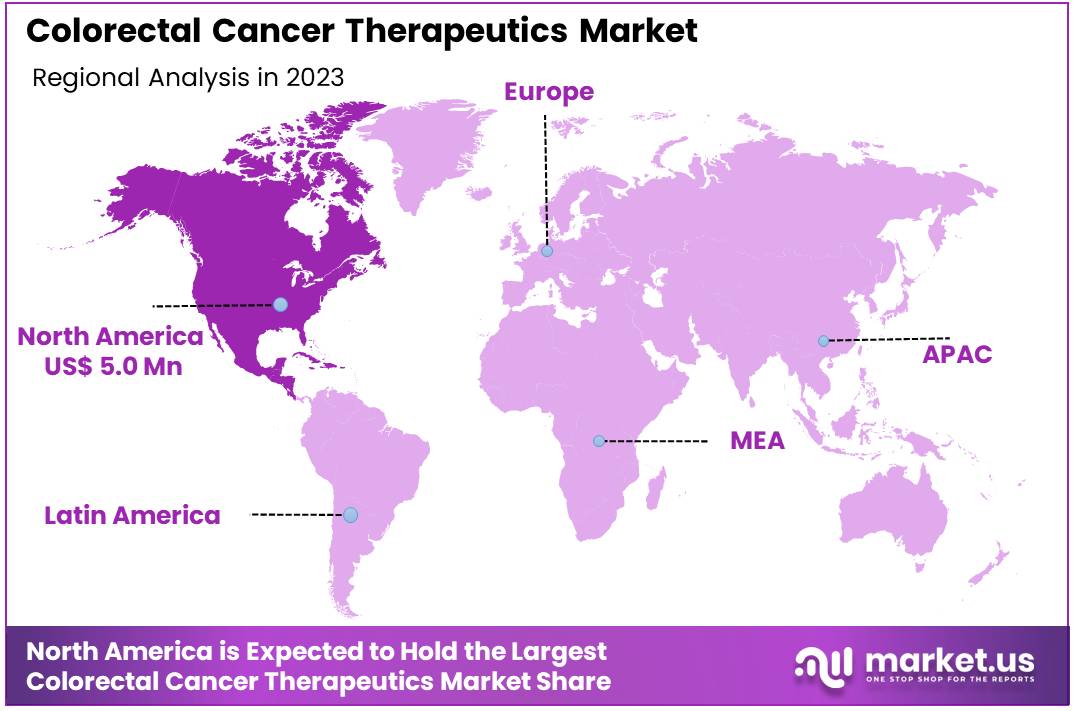Global Colorectal Cancer Therapeutics Market By Therapy (Targeted Therapy, Immunotherapy, and Chemotherapy), By Treatment Provider (Hospitals, Speciality Clinics, and Cancer Research Centers), By Region, and Key Companies - Industry Segment Outlook, Market Assessment, Competition Scenario, Trends and Forecast 2024-2033
- Published date: Dec 2024
- Report ID: 135798
- Number of Pages: 336
- Format:
-
keyboard_arrow_up
Quick Navigation
- Report Overview
- Key Takeaways
- By Therapy Analysis
- By Treatment Provider Analysis
- Key Segments Analysis
- Increasing Incidence and Prevalence of Colorectal Cancer
- Market Restraints
- Market Opportunities
- Impact of macroeconomic factors / Geopolitical factors
- Latest Trends
- Regional Analysis
- Key Players Analysis
- Recent Developments
- Report Scope
Report Overview
Global Colorectal Cancer Therapeutics Market size is expected to be worth around US$ 19.8 Billion by 2033 from US$ 12.5 Billion in 2023, growing at a CAGR of 4.7% during the forecast period from 2024 to 2033. In 2023, North America led the market, achieving over 40% share with a revenue of US$ 5.0 Billion.
The rising global incidence of colorectal cancer (CRC), driven by factors such as ageing populations, unhealthy diets, and sedentary lifestyles, is a major growth factor. This has increased the demand for effective treatments, including chemotherapy, targeted therapies, immunotherapies, and novel biologics. Advances in precision medicine and biomarkers are also enhancing the effectiveness of CRC treatments, leading to more personalised, targeted therapeutic approaches.
Additionally, the growing adoption of minimally invasive surgical techniques and advancements in radiotherapy contribute to improved patient outcomes, further boosting market growth. However, high treatment costs and access to advanced therapies in low and middle-income regions may limit market potential.
Furthermore, stringent regulatory approvals and the complexity of developing effective therapies present challenges for manufacturers. Despite these hurdles, the increasing focus on early detection, improved treatment options, and expanding research and development investments are expected to drive the market forward.
- A study published in the National Library of Medicine in October 2021 found that colorectal cancer (CRC) represented about 10.0% of global cancer cases in 2020 and 9.4% of cancer-related deaths, making it the second deadliest cancer type, after lung cancer, which accounted for 18% of cancer deaths worldwide.

Key Takeaways
- The global colorectal cancer therapeutics market was valued at USD 12.5 billion in 2023 and is anticipated to register substantial growth of USD 19.8 billion by 2033, with a 4.7% CAGR.
- In 2023, the Immunotherapy segment took the lead in the global market, securing 49% of the total revenue share.
- Among treatment provider segments, hospitals emerged as the dominant segment, capturing 45% of the total revenue.
- North America maintained its leading position in the global market with a share of over 40% of the total revenue.
By Therapy Analysis
Based on therapy the market is fragmented into targeted therapy, immunotherapy, and chemotherapy. Amongst these, immunotherapy dominated the global colorectal cancer therapeutics market capturing a significant market share of 49% in 2023. Immunotherapy has emerged as a dominant force in the global colorectal cancer therapeutics market, due to its promising efficacy and growing adoption.
Immunotherapies, particularly checkpoint inhibitors like pembrolizumab and nivolumab, have revolutionized the treatment of colorectal cancer, especially for patients with microsatellite instability-high (MSI-H) or mismatch repair deficient (dMMR) tumors.
These therapies work by enhancing the body’s immune system to recognize and attack cancer cells, offering a more targeted and less invasive approach compared to traditional treatments like chemotherapy. The success of immunotherapy in clinical trials, along with its ability to improve survival rates and quality of life, has contributed to its widespread use.
Additionally, the increasing focus on personalized medicine, along with the development of combination therapies, has further propelled the growth of the immunotherapy segment. As research continues and new drugs are introduced, immunotherapy is expected to maintain its leading position in the colorectal cancer treatment landscape.
By Treatment Provider Analysis
The market is fragmented by treatment providers into hospitals, speciality clinics, and cancer research centres. Hospitals dominated the global colorectal cancer therapeutics market capturing a significant market share of 45% in 2023. Hospitals have dominated the global colorectal cancer therapeutics market, due to their central role in providing specialized cancer care and advanced treatment options.
These healthcare facilities are equipped with advanced infrastructure, including access to cutting-edge diagnostic tools, surgical interventions, and personalized treatment regimens such as chemotherapy, immunotherapy, and targeted therapies. The presence of oncologists, surgeons, and multidisciplinary care teams in hospitals allows for comprehensive management of colorectal cancer, from diagnosis to post-treatment care, which enhances patient outcomes and survival rates.
Additionally, hospitals are key players in clinical trials, contributing to the development and approval of new therapies, further solidifying their importance in the market. As colorectal cancer treatments become more complex and personalized, hospitals are expected to continue dominating the market, supported by growing patient numbers and the increasing demand for specialized cancer care.

Key Segments Analysis
By Therapy
- Targeted Therapy
- Immunotherapy
- Chemotherapy
By Treatment Provider
- Hospitals
- Speciality Clinics
- Cancer Research Centers
Increasing Incidence and Prevalence of Colorectal Cancer
The increasing incidence and prevalence of colorectal cancer (CRC) are major drivers of growth in the colorectal cancer therapeutics market. As lifestyle factors, aging populations, and genetic predispositions contribute to rising CRC cases globally, the demand for effective treatment options has surged.
Additionally, the increasing number of clinical trials and regulatory approvals for innovative therapies are expanding the market. With CRC becoming one of the leading causes of cancer-related deaths, the urgent need for more effective and accessible treatments continues to drive investment and innovation in the therapeutic landscape for colorectal cancer.
- For instance, according to the American Cancer Society, it is anticipated that 152,810 individuals in the U.S. will be diagnosed with colorectal cancer in 2024.
Market Restraints
High Treatment Costs and Significant Side Effects
High treatment costs and significant side effects associated with colorectal cancer (CRC) therapies are key factors restraining market growth. The advanced therapies, such as targeted therapies and immunotherapies, are often expensive due to the complexity of their development and production processes.
This makes them less accessible, particularly in low- and middle-income regions, limiting their widespread use. Moreover, while these therapies can be effective, they frequently come with severe side effects, including fatigue, gastrointestinal issues, and immune-related reactions.
These adverse effects not only affect patient quality of life but also lead to increased healthcare costs due to the need for additional management and hospitalization.
Market Opportunities
Increasing Healthcare Expenditure
The increasing need for advanced and effective drugs is creating significant growth opportunities in the colorectal cancer (CRC) therapeutics market. With the rising incidence of CRC globally, there is a growing demand for innovative treatments that offer better outcomes and fewer side effects compared to traditional therapies.
Major research and development (R&D) advancements have led to the introduction of novel therapeutics, such as targeted therapies, immunotherapies, and personalized medicine, which have demonstrated higher success rates and improved patient survival. These innovations are transforming the treatment landscape by addressing the genetic mutations and immune system factors specific to CRC.
As a result, new drug pipelines are gaining traction, and pharmaceutical companies are increasingly focusing on the development of more effective, precise therapies. This creates vast growth opportunities for the market
- For instance, in June 2021, Bristol Myers Squibb announced that the European Commission (EC) had approved the combination of Opdivo and Yervoy for the treatment of adult patients with microsatellite instability-high (MSI-H) metastatic colorectal cancer (mCRC). This approval grants marketing authorization for the treatment across all EU member states, as well as Norway, Iceland, and Liechtenstein.
Impact of macroeconomic factors / Geopolitical factors
Macroeconomic and geopolitical factors have a notable impact on the global colorectal cancer therapeutics market, influencing both market share and growth. Economic conditions, such as global recessions or periods of economic instability, can affect healthcare spending, influencing the affordability and accessibility of advanced cancer treatments.
In wealthier regions, high healthcare budgets allow for the adoption of costly therapies like immunotherapy and precision medicine, helping to capture a larger market share. However, in low- and middle-income countries, economic constraints can limit access to newer treatments, slowing market growth in those regions. Geopolitical factors, such as trade policies, regulatory changes, and conflicts, can also affect the availability of cancer therapeutics, supply chains, and pricing.
For instance, tariffs on pharmaceutical imports or disruptions in global supply chains can delay drug availability or increase costs. Conversely, geopolitical cooperation and international research collaborations can accelerate the development and distribution of colorectal cancer treatments, expanding market reach and driving growth.
Latest Trends
The global colorectal cancer therapeutics market is witnessing several key trends that are contributing to its significant market share. Immunotherapy, particularly immune checkpoint inhibitors like pembrolizumab and nivolumab, is gaining prominence due to its effectiveness in treating microsatellite instability-high (MSI-H) and mismatch repair deficient (dMMR) colorectal cancers. This shift toward immunotherapy is being fueled by advances in personalized medicine, enabling more targeted and effective treatments based on individual genetic profiles.
Additionally, the growing adoption of precision medicine, which tailors treatments to genetic mutations and biomarkers, is enhancing patient outcomes and driving market expansion. The rise of combination therapies, where immunotherapy is combined with chemotherapy or targeted treatments, is also a noteworthy trend.
Furthermore, advancements in minimally invasive surgical techniques and the increasing focus on early detection through screening are improving survival rates, further boosting demand for therapeutics. These trends are collectively shaping the market’s growth and strengthening its dominant position in global cancer treatment.
Regional Analysis
North America held a large share of 40% of the global colorectal cancer therapeutics market driven by a high incidence of colorectal cancer (CRC) in the region, particularly in the United States, where lifestyle factors such as increasing alcohol consumption, poor diets, and sedentary behaviours contribute to rising cases.
The region’s advanced healthcare infrastructure also supports high treatment rates, with widespread access to cutting-edge therapies like immunotherapy, targeted treatments, and precision medicine. Additionally, the higher cost of healthcare services and medicines in North America, compared to other major regions, has further boosted the market share, as patients often have access to the latest, premium therapies.
Increased awareness and proactive screening programs also lead to earlier diagnosis, improving treatment outcomes and fuelling demand for therapeutics. As healthcare spending continues to grow in North America, the colorectal cancer therapeutics market is expected to maintain its dominant position in the global landscape.

Key Regions and Countries
North America
- US
- Canada
Europe
- Germany
- France
- The UK
- Spain
- Italy
- Russia
- Netherland
- Rest of Europe
Asia Pacific
- China
- Japan
- South Korea
- India
- New Zealand
- Singapore
- Thailand
- Vietnam
- Rest of APAC
Latin America
- Brazil
- Mexico
- Rest of Latin America
Middle East & Africa
- South Africa
- Saudi Arabia
- UAE
- Rest of MEA
Key Players Analysis
The global colorectal cancer (CRC) therapeutics market is characterized by a significant market share held by key pharmaceutical companies, which dominate the landscape with a range of advanced treatments. Leading players include Merck & Co., Bristol-Myers Squibb, Amgen, and Eli Lilly, all of which offer therapies such as chemotherapy agents, immunotherapy, targeted therapies, and precision medicine solutions.
Immunotherapies, particularly checkpoint inhibitors like pembrolizumab and nivolumab, are gaining traction, particularly for microsatellite instability-high (MSI-H) and mismatch repair deficient (dMMR) cancers, helping these companies capture substantial market share. The market is also influenced by emerging biotech firms and partnerships between pharmaceutical companies and research institutions, accelerating drug development and approval.
Furthermore, companies are increasingly focusing on combination therapies, enhancing the efficacy of treatments. With a growing pipeline of novel therapies and the expansion of personalized treatment options, these key players are driving market growth and shaping the future of CRC therapeutics.
Top Key Players
- Bayer AG
- Bristol Myers Squibb
- Eli Lilly and Company
- Genentech, Inc.
- Ipsen Biopharmaceuticals, Inc.
- Merck & co., Inc.
- Pfizer Inc.
- Regeneron Pharmaceuticals, Inc.
- Sanofi
- Teva Pharmaceutical Industries Ltd.
- Taiho Pharmaceutical
- Novartis AG
Recent Developments
- September 2020: Boehringer Ingelheim and Mirati Therapeutics, Inc. announced a clinical collaboration to investigate a novel combination targeting KRAS G12C and its activator SOS1. This partnership aims to deliver more effective and durable responses, offering additional therapeutic options for patients with lung and colorectal cancers.
- July 2020: Taiho Pharmaceutical Co., Ltd. launched its anticancer drug, LONSURF, in China for the treatment of colorectal cancer patients. The company expects Lonsurf to make a significant impact as a treatment option for colorectal cancer, benefiting both patients and medical institutions.
- In June 2020: The U.S. Food and Drug Administration (FDA) approved Keytruda for intravenous injection to treat patients with mismatch repair deficient (dMMR) colorectal cancer. This marks the first-line immunotherapy for such patients, to be administered without the need for chemotherapy.
Report Scope
Report Features Description Market Value (2023) US$ 12.5 billion Forecast Revenue (2033) US$ 19.8 billion CAGR (2024-2033) 4.7% Base Year for Estimation 2023 Historic Period 2018-2022 Forecast Period 2024-2033 Report Coverage Revenue Forecast, Market Dynamics, Competitive Landscape, Recent Developments Segments Covered By Therapy (Targeted Therapy, Immunotherapy, and Chemotherapy), By Treatment Provider (Hospitals, Speciality Clinics, and Cancer Research Centers) Regional Analysis North America – US, Canada; Europe – Germany, France, The UK, Spain, Italy, Russia, Netherlands, Rest of Europe; Asia Pacific – China, Japan, South Korea, India, New Zealand, Singapore, Thailand, Vietnam, Rest of APAC; Latin America – Brazil, Mexico, Rest of Latin America; Middle East & Africa – South Africa, Saudi Arabia, UAE, Rest of MEA Competitive Landscape Bayer AG, Bristol Myers Squibb, Eli Lilly and Company, Genentech, Inc., Ipsen Biopharmaceuticals, Inc., Merck & co., Inc., Pfizer Inc., Regeneron Pharmaceuticals, Inc., Sanofi, Teva Pharmaceutical Industries Ltd., Taiho Pharmaceutical, Novartis AG and other key players Customization Scope Customization for segments, region/country-level will be provided. Moreover, additional customization can be done based on the requirements. Purchase Options We have three licenses to opt for: Single User License, Multi-User License (Up to 5 Users), Corporate Use License (Unlimited User and Printable PDF)  Colorectal Cancer Therapeutics MarketPublished date: Dec 2024add_shopping_cartBuy Now get_appDownload Sample
Colorectal Cancer Therapeutics MarketPublished date: Dec 2024add_shopping_cartBuy Now get_appDownload Sample -
-
- Bayer AG
- Bristol Myers Squibb
- Eli Lilly and Company
- Genentech, Inc.
- Ipsen Biopharmaceuticals, Inc.
- Merck & co., Inc.
- Pfizer Inc.
- Regeneron Pharmaceuticals, Inc.
- Sanofi
- Teva Pharmaceutical Industries Ltd.
- Taiho Pharmaceutical
- Novartis AG









